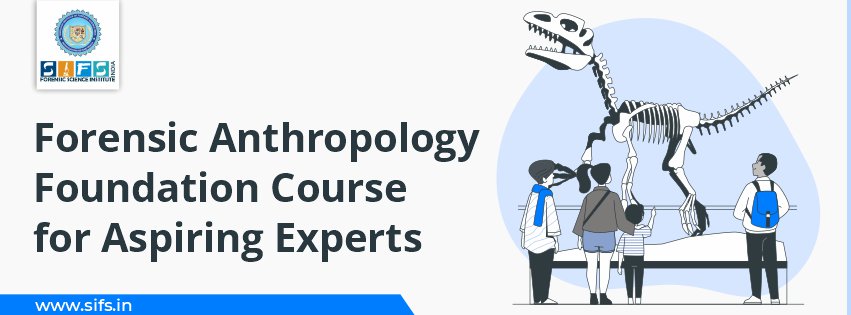- Call Us: +91 7303913002
- Email Us: education@sifs.in
Forensic Anthropology Foundation Course for Aspiring Experts

BY SIFS India | February 20, 2025
Forensic Anthropology Foundation Course for Aspiring Experts
Forensic anthropology is vital in solving mysteries where human remains are the only evidence left behind. Whether in crime scene investigations, mass disasters, or historical excavations, forensic anthropologists help reconstruct identities and uncover crucial details about an individual’s life and cause of death.
By studying skeletal remains, they determine characteristics such as age, sex, ancestry, height, and trauma history, offering insights that assist law enforcement, legal professionals, and researchers.
The Forensic Anthropology Foundation Course for Aspiring Experts is designed for students, professionals, and enthusiasts who want to explore the scientific methods used in human identification and skeletal analysis.
This course provides a structured learning experience, equipping learners with theoretical knowledge and practical skills to analyze human remains in forensic contexts.
Why Forensic Anthropology Matters in Investigations?
Bones tell stories. Forensic anthropology reveals essential information that might otherwise remain undiscovered, from ancient remains to modern crime scenes.
By examining skeletal structures, forensic experts can estimate a person’s identity, determine how long they have been deceased, and assess any injuries or diseases that might have played a role in their death. This knowledge is critical in criminal investigations, war crime assessments, and disaster victim identification.
Forensic anthropologists collaborate with forensic pathologists, law enforcement, and human rights organizations to identify victims and provide closure to families.
Their expertise is particularly useful in cases where traditional identification methods, such as fingerprinting or DNA analysis, are impossible due to decomposition. In such scenarios, the detailed study of bones becomes the key to establishing identities and reconstructing events surrounding a person’s death.
Who Should Enroll in This Course?
This course is ideal for students and graduates in forensic science, anthropology, archaeology, and biology eager to explore human skeletal analysis.
Law enforcement officers, medical examiners, and forensic professionals looking to specialize in forensic anthropology will benefit from the in-depth knowledge and investigative techniques taught in this program.
It is also suited for researchers and enthusiasts who want to understand how forensic anthropologists decode evidence from bones.
No prior experience is required, making it accessible to beginners and those looking to expand their forensic expertise.
What You Will Learn in This Course?
The course begins with an introduction to forensic anthropology, explaining its significance in forensic science and legal investigations. Learners understand the human skeletal system by studying the structure and composition of bones, their functions, and how they change over time.
Determining age, sex, ancestry, and height from skeletal remains is explored in detail, offering essential techniques used in forensic casework.
A significant part of the course focuses on trauma and pathology analysis. Participants learn to distinguish between injuries that occurred before, around the time of death, and after death. This distinction helps forensic experts assess whether natural factors, accidents, or criminal activity caused trauma.
The course also covers excavation and recovery techniques, providing insights into how forensic anthropologists work at crime scenes, archaeological sites, and mass grave locations. Proper documentation, evidence collection, and maintaining the chain of custody are emphasized to ensure that remains are analyzed in a legally admissible manner.
Forensic taphonomy, which studies how bodies decompose in different environments, is another essential component. By understanding decomposition rates and environmental factors affecting skeletal remains, investigators can estimate the post-mortem interval, aiding in forensic case resolution.
Practical applications and real-world case studies are integrated into the curriculum to help learners connect theoretical knowledge with actual forensic investigations. This approach ensures that participants develop a strong foundation in skeletal analysis, preparing them for further studies or careers in forensic anthropology.
Why Choose SIFS India for Your Forensic Anthropology Training?
SIFS India has established itself as a leader in forensic education, offering expert-led courses designed to meet industry standards. The course provides LMS access, study materials, and mentorship from experienced forensic anthropologists, ensuring students receive academic and hands-on training.
The course is certified, making it a valuable credential for those seeking careers in forensic anthropology, crime scene investigation, and forensic research.
With a focus on practical case applications, learners gain relevant skills to analyze human remains in investigative and legal settings. The comprehensive training prepares participants to contribute effectively to forensic cases and research projects in anthropology.
Career Opportunities in Forensic Anthropology
Forensic anthropology offers diverse career opportunities in law enforcement agencies, forensic laboratories, universities, museums, and humanitarian organizations.
Trained professionals work as forensic anthropologists in crime labs, assisting in the identification of human remains from crime scenes, natural disasters, and mass casualty events.
Skeletal analysts play a crucial role in investigating missing persons, helping to reconstruct identities when traditional identification methods fail.
Opportunities also exist in academic research, where forensic anthropologists contribute to studying human evolution, bioarchaeology, and historical investigations.
Some professionals specialize in disaster response, assisting in identifying victims of natural disasters, conflicts, and mass graves.
The demand for forensic anthropologists continues to grow as forensic science becomes increasingly integral to solving crimes and humanitarian cases worldwide.
Start Your Journey in Forensic Anthropology Today
If you are fascinated by human identification and forensic investigation science, this course is the perfect foundation to build your expertise. Whether you aim to work in forensic labs, law enforcement, or academic research, gaining specialized knowledge in forensic anthropology will open new career pathways.
Inquire today about the Forensic Anthropology Foundation Course at SIFS India and take the first step toward a career in forensic identification and skeletal analysis.

